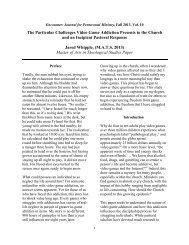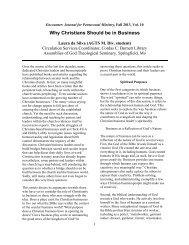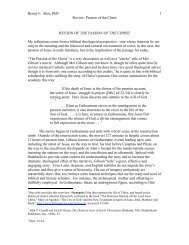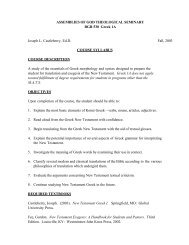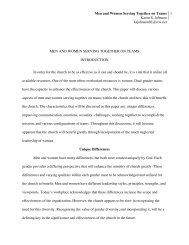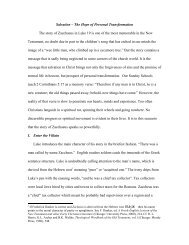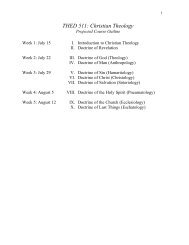Encounter: Journal for Pentecostal Ministry - Assemblies of God ...
Encounter: Journal for Pentecostal Ministry - Assemblies of God ...
Encounter: Journal for Pentecostal Ministry - Assemblies of God ...
Create successful ePaper yourself
Turn your PDF publications into a flip-book with our unique Google optimized e-Paper software.
should go to the Gentiles, and<br />
they to the Jews. All they<br />
asked was that we should<br />
continue to remember the<br />
poor, the very thing I was<br />
eager to do.<br />
Antioch became Paul‟s home base<br />
during his missionary journeys from<br />
which he gathered the Jerusalem<br />
collection. 77<br />
Historical Examples <strong>of</strong> Individual<br />
Benevolence Commended<br />
While Luke illustrates the idea <strong>of</strong><br />
almsgiving and caring <strong>for</strong> the poor in<br />
communal fashion, he also includes some<br />
individual examples. For instance, Luke<br />
gives an account <strong>of</strong> Tabitha, a disciple “who<br />
was always doing good and helping the<br />
poor” (Acts 9:36). In the story, Tabitha died,<br />
and the other disciples rushed to Peter,<br />
asking him to come and pray <strong>for</strong> her (v. 38).<br />
Through the prayers <strong>of</strong> Peter, the Holy Spirit<br />
raised Tabitha from the dead (v. 40). One <strong>of</strong><br />
the highly important points <strong>of</strong> this story,<br />
however, is the fact that the widows stood<br />
weeping at Tabitha‟s death showing Peter<br />
the robes and clothing that Tabitha had<br />
previously made them (v. 39). Kim<br />
concludes that Luke may have recorded this<br />
story in order to emphasize the significance<br />
<strong>of</strong> benevolence, “such that Tabitha got her<br />
life back because <strong>of</strong> her good works and<br />
alms she had contributed towards the<br />
poor.” 78<br />
Another significant example <strong>of</strong> an individual<br />
display <strong>of</strong> generosity and care <strong>for</strong> the poor is<br />
Cornelius, as seen in Acts 10:2. Cornelius, a<br />
“<strong>God</strong>-fearing” man “gave generously to<br />
those in need and prayed to <strong>God</strong> regularly.”<br />
According to Kim, this verse is significant<br />
<strong>for</strong> several reasons. When Cornelius had a<br />
vision from <strong>God</strong>, the angel told him that his<br />
prayers and gifts to the poor had “come up<br />
12<br />
as a memorial <strong>of</strong>fering be<strong>for</strong>e <strong>God</strong>” (v. 4).<br />
Later on in the account <strong>of</strong> Cornelius‟<br />
conversion, the reader is told that Cornelius<br />
was “respected by all the Jewish people” (v.<br />
22). These details reveal that Cornelius<br />
earned recognition by <strong>God</strong> and his neighbors<br />
<strong>for</strong> his faith, as well as his benevolent acts<br />
towards those in need. 79 This passage<br />
confirms <strong>God</strong>‟s acknowledgment <strong>of</strong><br />
Cornelius‟ prayers and generosity to the<br />
poor resulting in the Jerusalem church‟s<br />
approval <strong>of</strong> evangelism to the Gentiles. 80<br />
The reader can clearly identify Luke‟s<br />
emphasis on caring <strong>for</strong> the poor and needy<br />
when he includes Jesus‟ command quoted<br />
by Paul in Acts 20:35: “In everything I did, I<br />
showed you that by this kind <strong>of</strong> hard work<br />
we must help the weak, remembering the<br />
words the Lord Jesus himself said: „It is<br />
more blessed to give than to receive.‟” Kim<br />
asserts that the context <strong>of</strong> the word “weak”<br />
in this passage implies those lacking wealth<br />
due to the use <strong>of</strong> the Greek word οί<br />
άσθενούυτεѕ. 81 Interestingly, this<br />
particular saying <strong>of</strong> Jesus is not found in any<br />
<strong>of</strong> the four Gospels. 82 These words <strong>of</strong> Christ<br />
were <strong>of</strong> such importance that Paul spoke<br />
them in his final testimony. As Pilgrim<br />
states, “We find this word from the Lord, „It<br />
is more blessed to give than to receive,‟ to<br />
be a most fitting conclusion to Luke‟s<br />
presentation <strong>of</strong> the theme <strong>of</strong> wealth and<br />
poverty and the proclamation <strong>of</strong> good news<br />
to the poor.” 83 Luke obviously encouraged<br />
care <strong>for</strong> the poor as a significant part <strong>of</strong> the<br />
Christian lifestyle, revealed in the words <strong>of</strong><br />
Jesus himself. A final example <strong>of</strong> concern<br />
<strong>for</strong> the poor in Acts is the statement in 24:17<br />
in which Paul reveals that he came to<br />
Jerusalem “to bring my people gifts <strong>for</strong> the<br />
poor and to present <strong>of</strong>ferings.”<br />
While Luke‟s Gospel certainly confirms that<br />
believers should aid the physically and<br />
economically weak and welcome them into




